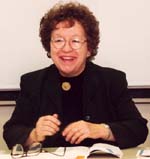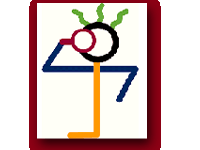|


Thesis-writing
Group News
Another
Successful Semester:
Thesis-writing Support Offered by Cain Project in Fall
The
Cain Project offered three types of thesis-writing support this
past semester: a Saturday thesis-management workshop, a pilot four-session
class for those at the thesis proposal-writing stage, and two semester-long
thesis-writing groups. All were led by Cain Project Instructor Jan
Hewitt, who was assisted by Janie Hammons, a writing coach from
the Cain Project.
Thesis-management Workshop
Fifteen students attended the interactive Saturday workshop, open
to all graduate students in science and engineering. Speakers included
Linda Driskill, Director of the Cain Project; Lindley Doran, Director
of the Rice Counseling Center; Dan Wallach, Assistant Professor
in Computer Science; and Jan Hewitt. Their topics focused on handling
stress; avoiding carpal tunnel problems; and planning, writing,
and defending a thesis.
Thesis-writing advice from a student’s perspective came from
a panel of three successful graduate students, all of whom had participated
in a thesis-writing group: Stephanie Glenn, who received her PhD
in Civil and Environmental Science last May; Eric Allen, PhD candidate
in Computer Science; and Richard Swartz, who defended his PhD in
Statistics in November.
Those attending were enthusiastic about all aspects of the workshop.
One student commented, “Great coverage. By far the best workshop
I’ve attended in the last 2.5 years here! Thanks!!”
Proposal-writing Group
When nearly 50 graduate students applied for the 20 openings in
the two thesis-writing groups, the Cain Project offered a short
pilot course for the 20 applicants at the proposal-writing stage.
The four sessions first gave an overview of the proposal-writing
process and then gave detailed suggestions for thinking through
the content, organization, style, and order of writing. The students
wrote a problem statement, received written feedback, and then rewrote
the statement.
Thesis-writing Groups
The always popular thesis-writing groups focused on such topics as
deciding what to include, deciding what to write first, foregrounding
key ideas, organizing the material, explaining rather than simply
reporting, reducing wordiness, using passive voice appropriately,
writing topic sentences, and adding transitions. The students wrote
an abstract, received written feedback, and then rewrote it, checking
to see if they had answered the following seven key questions:
- What is the problem you address in your thesis?
- Why is that problem important?
- How does your work fit into the larger scientific/engineering
context of your field?
- What method(s) do you use to solve the problem?
- What are your findings so far or what are your expected results?
- What is your unique contribution?
- What are some possible applications of your work?
In addition to the weekly group meetings, students met individually
with either Jan Hewitt or Janie Hammons to discuss up to 30 pages
of manuscript. Three students have already defended; many others
expect to finish by May.
|


